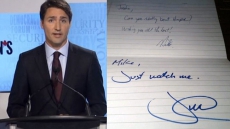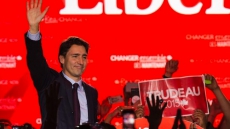Five things to know about Valeant Pharmaceuticals, which is under fire in the U.S. for some of its business practices:
The company: The pharmaceutical giant, based in Laval, Que., is a publicly traded, multinational specialty drug company that focuses on neurology, dermatology and eye care. Among its subsidiaries are Bausch & Lomb and Salix Pharmaceuticals. It employs 18,000 people worldwide. In addition to its prescription drugs, Valeant's non-prescription retail brands include Cold-Fx and Swiss Natural.
Trouble: Valeant was trading at a 52-week low last week after its stock fell as much as 39 per cent — prompting a brief halt in trading. That happened amid a scathing report on the drugmaker's use of specialty pharmacies on the heels of news that U.S. lawmakers were also taking a close look at the company's pricing practices.
The report by Citron Research called Valeant "the pharmaceutical Enron," accusing the company of setting up phantom pharmacies to fool auditors. That was vehemently denied by CEO Michael Pearson in a conference call on Monday, who urged U.S. securities regulators to investigate Citron. He said outsiders are trying to manipulate the market for their own gain.
Losses: The plummet in stock prices — which began upon word that American legislators were investigating the company — has resulted in billions of dollars of losses for Valeant shareholders. The company's shares peaked at $347.84 on Aug. 5, 2015, on the Toronto Stock Exchange.
As of midday on Monday, its stock price on the TSX was $150.77, a decline of 1.9 per cent from Friday's close.
Specialty pharmacies: Designed to help distribute certain drugs, including those that need constant refrigeration, they are exempt in the U.S. from reporting their sales to IMS Health, which tracks pharmaceutical sales for the industry south of the border.
Drugmakers say they use the pharmacies to encourage the use of expensive drugs that insurance companies often won't cover, and they consider these mail-order outlets essential to providing people with easier access to drugs. But insurance companies beg to differ, saying they promote high-priced drugs when much cheaper alternatives are available.
Interesting fact: Eugene Melnyk, the billionaire owner of the Ottawa Senators and founder of drug maker Biovail Corp., fired off his own allegations in 2014 against Valeant, the company that now controls his one-time business.
Melnyk alleged that Valeant is merely posing as a Canadian company to make use of Canada's international fiscal treaties and dodge U.S. taxes. Valeant responded that it's doing nothing wrong and follows all the rules in the jurisdictions where it operates.





